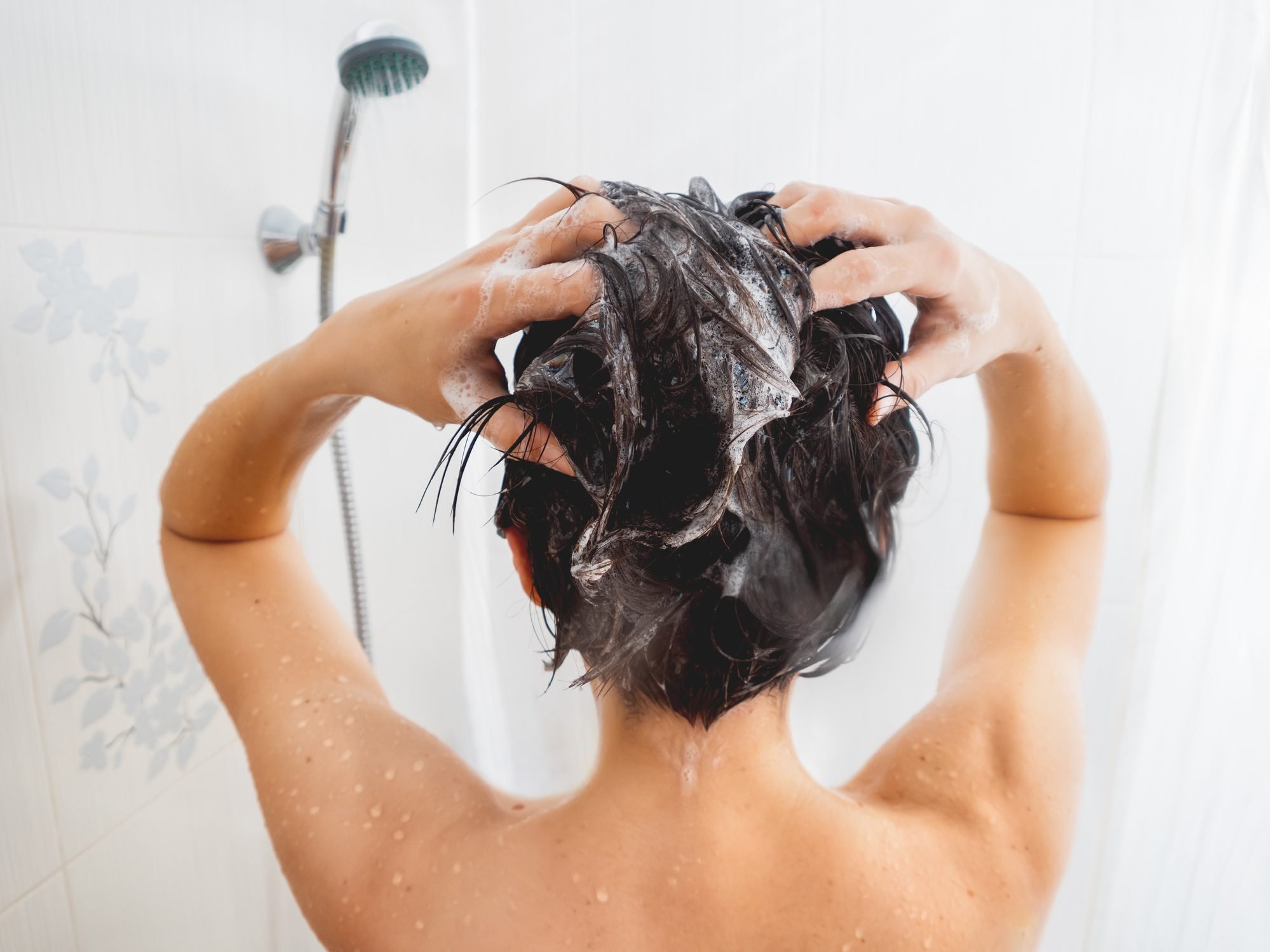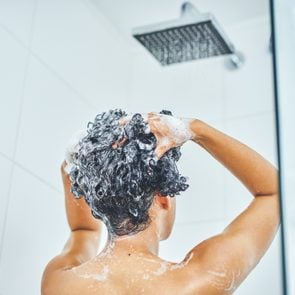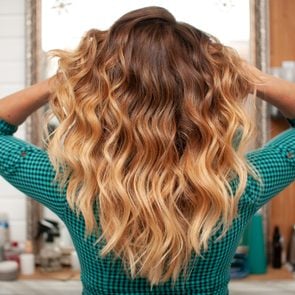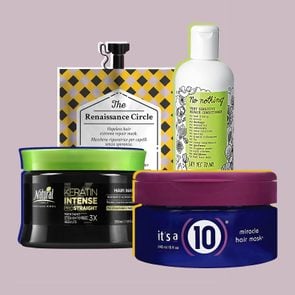Because we all have that bottle of shampoo that's been sitting in the corner of the shower forever

Here’s What Will Happen If You Use Expired Shampoo

Picture this: You’re in the shower getting ready to wash your hair when you spot an old bottle of shampoo tucked back behind your body wash. It’s been there for—well, you can’t even remember how long. Can you still use it, or does shampoo expire?
There are a number of bathroom items with surprising expiration dates, like toothpaste, bar soap and makeup. But the FDA doesn’t actually require an expiration date on normal bottles of shampoo unless it is a functional one with medical claims (like a dandruff shampoo), says Giorgio Dell’Acqua, a cosmetic chemist and the chief science officer at Nutrafol. However, he adds, many brands do list a PAO. This stands for “period after opening,” one of the more common beauty-product packaging symbols that states the number of months after which a brand recommends consumers stop using the product after opening it. This number is listed on many of the best shampoos.
But what happens if you go ahead and use that old shampoo? Read on to find out.
Get Reader’s Digest’s Read Up newsletter for more beauty tips, humor, cleaning, travel, tech and fun facts all week long.
Does shampoo expire?
The short answer is that even the best shampoos expire—but it’s not in the same way that, say, milk expires. When milk goes bad, it smells terrible and will make you sick if you drink it. Expired shampoo, on the other hand, may just become less effective. “Performance may become affected, and other things like the fragrance may shift as time passes,” says Madison Thurman, a cosmetic chemist and the research and development applications manager at the hair-care company Not Your Mother’s.
As mentioned, the best way to determine when your shampoo will expire is by looking for the PAO symbol. This can usually be found on the back or bottom of a shampoo bottle. The symbol looks like a small open jar that has a number printed on it. That number is how many months that shampoo is good from the date you open it.
How long does shampoo last?
Exactly how long a bottle of shampoo will last varies from brand to brand. Generally speaking, you will probably use a bottle of shampoo before it expires, says Thurman, who notes that an unopened bottle of shampoo could last for up to three years. As for after it’s been opened, it is best to rely on that PAO symbol to determine how long your bottle will last. The PAO expiration date for shampoo can be anywhere from 6 months to 24 months.
It’s worth noting that all shampoo—whether it’s cheap shampoo, shampoo bars or shampoos for frizzy hair—will eventually expire. But if you prefer shampoo crafted with natural ingredients, you may notice it has a shorter PAO expiration date. “Shampoos with a large number of more naturally derived ingredients can have a higher probability of shifting color, odor and appearance faster than shampoos with fewer of those ingredients,” explains Thurman.
But formula type isn’t the only thing that can impact expiration date. Exposure to heat and sun can also impact the stability of a shampoo and accelerate the expiration date, says Dell’Acqua. Of course, anything you keep in the shower is exposed to some degree of heat and humidity—and our experts agree that most shampoos will stand up to this. But if you have a window in your shower, it may be best to avoid putting your hair-care bottles on the ledge of said window so the sun doesn’t beat down on them.
How long does dry shampoo last?
Now you know the answer to the question “Does shampoo expire?” and the general timeline regarding expiration. Does the same hold true for dry shampoo? Nope! Dry shampoos do not follow the same rules as the type you use in the shower. This is mostly because of how they are packaged. Most dry shampoo comes in an aerosol can, which can preserve ingredients far longer. Plus, water isn’t present in dry shampoo, and powders tend to last much longer. Because of these factors, most dry shampoos do not have a PAO.
Even still, dry shampoo will eventually become less effective. “Most manufacturers of dry shampoo will be in line with the three-year shelf life of regular shampoos,” says Thurman, who notes that exposure to extreme heat or humidity can shorten the life span of your bottle of dry shampoo.
What happens when you use expired shampoo?
First, some good news: Chances are, your hair isn’t going to fall out or become irreparably damaged if you use expired shampoo. It often just means it won’t work quite as well, says Dell’Acqua. You may find it doesn’t clean your hair as well as it once did. Or if you have a formula that says it will do a specific thing (like a shampoo for oily hair or curly hair), you may notice it’s not living up to that promise.
There’s also a chance that your shampoo may start to look or smell funky. “After the product expires, preservation of the shampoo is not assured—meaning microorganisms can grow, causing the product to smell, color or [change in] viscosity,” says Dell’Acqua, who adds that in some cases, there’s a risk of scalp irritation.
How do you know if your shampoo has gone bad?
There are a few ways to determine if your shampoo is past its prime. Many of them have to do with examining what your shampoo looks and feels like. But there are a few less hands-on ways to tell if your shampoo has gone bad too.
The PAO has come and gone
One of the easiest ways to tell if it’s time to move on from your shampoo is to check the PAO. As mentioned, the PAO is a symbol that looks like an open jar with a number in the center, and it can often be found on the back or bottom of a bottle. If your shampoo doesn’t have a PAO symbol on the packaging, visit the brand’s website to see if it lists product expiration dates.
Your hair doesn’t feel clean
Expired shampoo may stop working as well as it once did, reminds Thurman. So if you’ve been washing your hair and it just doesn’t feel clean, it could be a sign that your shampoo is past its prime. The same goes for other common problems that shampoos solve. Say your shampoo for thinning hair used to make your strands feel luscious and thick, and now it doesn’t. Or your clarifying shampoo no longer leaves strands feeling squeaky clean. This may be a sign that you should toss that bottle.
The shampoo looks a little funky
If you pour some shampoo into your palm and it comes out looking a little odd, don’t use it. “Expired shampoo may have an appearance that deviates from the standard you are used to seeing,” says Thurman. This may present in a variety of ways.
Sometimes the ingredients in expired shampoos will separate, and you may notice oil or a watery substance pooling at the top, says Dell’Acqua, who also points out that the color may change or the viscosity could shift. (The latter means your shampoo may suddenly feel more watery, super thick, bumpy, lumpy or even sticky.)
It smells sour … or like nothing at all
Both Thurman and Dell’Acqua say that old shampoo may start to smell different. If your formula was fragranced, it may lose the intensity of that scent. Or if it was unscented to start with, it might start smelling sour or like chemicals. If you think your shampoo may be expired, Dell’Acqua suggests unscrewing the cap and seeing if it smells odd or different.
Does conditioner expire?
Conditioner follows the same guidelines as shampoo when it comes to expiration dates , says Thurman. The best way to determine when your conditioner will go bad is to rely on the PAO symbol. If you can’t remember when you opened your conditioner, look for the same signs as you would with expired shampoo—a change in efficacy, texture or smell.
So what will happen if you accidentally use expired conditioner? “Like shampoo, it could be that nothing happens,” says Thurman. “But if something does happen, the most common thing is for it to just not work as well.”
If you don’t think you can remember when you opened your shampoo or conditioner and, therefore, won’t know how to track the PAO, consider keeping your open dates in the notes app on your phone. That way, if you ever question it, you can do a quick check in your phone to determine if your shampoo or conditioner is expired. Problem solved!
About the experts
- Giorgio Dell’Acqua is a cosmetic chemist and the chief science officer at Nutrafol.
- Madison Thurman is a cosmetic chemist and the research and development applications manager at Not Your Mother’s.























